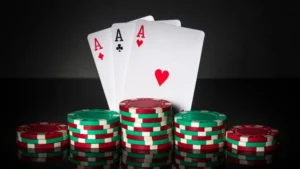
To the casual observer, poker might look like a game of luck — a few cards, some chips, and a bit of bluffing. But inside the mind of a poker master, every move is deliberate, every decision is calculated, and every emotion is controlled. True mastery in master poker comes from the perfect balance of strategy, psychology, and patience. Let’s take a closer look at how professional players think, plan, and win.
The Strategic Core of Poker
At the heart of every poker master lies a deep understanding of strategy. They don’t just play their cards — they play the players, the positions, and the probabilities. Every hand is an opportunity to apply logic and data-driven decisions. From choosing which hands to play pre-flop to calculating pot odds and implied odds, every choice contributes to a long-term edge.
Poker masters understand that consistency beats short-term luck. They develop strategies that maximize profits over thousands of hands, not just one night of play. This disciplined, analytical approach separates professionals from emotional amateurs.
The Power of Psychology
Poker is as much a mental game as it is a mathematical one. Reading opponents, manipulating perceptions, and controlling one’s own emotions are all vital skills. A poker master can interpret subtle cues — the speed of a bet, a change in tone, or even a shift in breathing — to deduce the strength of an opponent’s hand.
At the same time, they’re masters of deception. Through calculated bluffs, misleading bet sizes, and consistent table image control, they influence how others perceive their play. Psychology is the invisible thread that ties strategy to execution.
The Discipline of Patience
Perhaps the most underrated skill in poker is patience. Masters don’t chase every hand; they wait for the right moment to strike. They understand that folding is not a sign of weakness but a strategic decision to preserve chips for better opportunities.
Patience also applies to emotional control. Poker can be a rollercoaster of wins and losses, but masters stay calm and focused. They know that short-term results mean little compared to making consistently good decisions over time.
The Balance Between Logic and Intuition
While poker is rooted in mathematics, intuition plays a crucial role at higher levels. Masters develop instincts through thousands of hours of experience. These instincts allow them to make tough calls when the data is incomplete. The key, however, is balance — intuition should guide, not replace, logical reasoning.
The best players trust their gut only when it aligns with sound strategic thinking. This harmony between logic and instinct gives them a unique edge over less experienced opponents.
The Continuous Pursuit of Improvement
Poker mastery isn’t a destination; it’s a journey. Even the best players continually review their games, study new strategies, and learn from mistakes. They understand that the game evolves, and to stay ahead, they must evolve too.
This mindset of lifelong learning and humility is what keeps poker masters sharp. They never assume they’ve “figured it all out” — because the moment they stop learning, they start losing.
Conclusion
Inside the mind of a poker master lies a powerful combination of strategy, psychology, and patience. They approach every game like a chess match — anticipating moves, reading emotions, and waiting for the perfect moment to act. Poker mastery isn’t about luck; it’s about discipline, insight, and mental strength. By thinking like a master, you can transform not just your poker game, but the way you approach every challenge in life.





